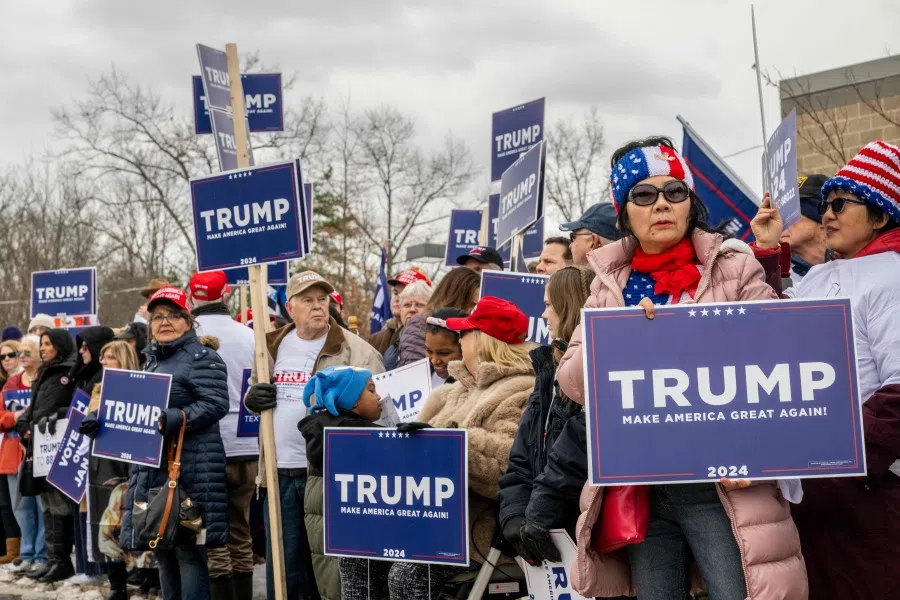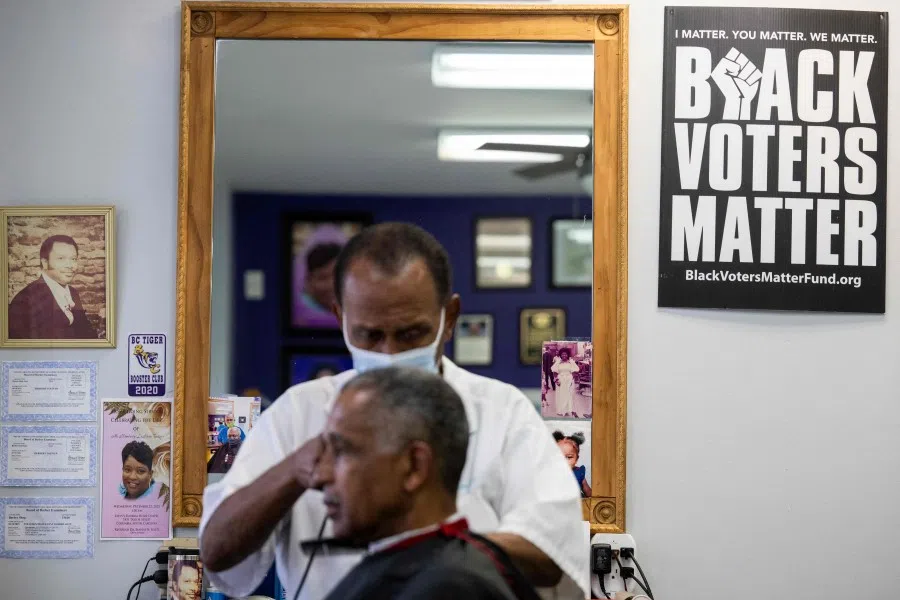2024 US election: A face-off between common sense and counterintuition
US-based economist He Qinglian notes that with former US President Donald Trump likely to be the Republican candidate in the next US presidential elections, perhaps it is worth taking another look at who his supporters are, as well as the effects of the Democratic policies of the last four years.

Former US President Donald Trump won a decisive victory in the Iowa party caucus on 15 January, winning 98 out of 99 counties in the state. This result rocked the anti-Trump camp, comprising the American left and nominal Republicans within the Republican Party.
Mainstream media, including the Wall Street Journal (WSJ), revived the familiar narrative since 2016: the Republican Party has become blue-collar, with the less educated making up the supporters of Trump's "Make America Great Again" (MAGA) movement, while educated Republicans support candidates such as Ron DeSantis and Nikki Haley. The essence of this narrative aims to portray the intense conflict between Trump opponents and supporters as a struggle between educated elites and less-educated grassroots - a clash between civilisation and anti-civilisation.
However, this is far from reality. This narrative has merely been amplified by the media and accepted without scrutiny.
Behind the left's propaganda adjustments
In contrast with the WSJ, the New York Times (NYT) presented an opposite viewpoint in an article on 15 January titled "How College-Educated Republicans Learned to Love Trump Again". The article said that working-class voters in Iowa delivered the Republican Party to Trump, but college-educated conservatives may ensure that he keeps it, adding that voters with a college degree remain at the heart of the lingering Republican Cold War over abortion, foreign policy and cultural issues.
The NYT cited a Suffolk University/USA Today poll conducted in January, showing that Trump had support from 62% of Republican voters, including 60% of those with a college degree. Other surveys also indicated similar trends. However, the NYT framed this as a change from 2023. The article cited that 14 months earlier, the same poll showed that 61% of Republican voters said that they still supported Trump's policies but wanted "a different Republican nominee for president", and 76% of college-educated Republicans agreed.
The claim that Trump supporters have a lower level of education has been debunked since the 2016 election.

Nonetheless, the NYT maintained that according to interviews with nearly two dozen college-educated Republican voters, "their surge toward the former president appears to stem largely from a reaction to the current political climate rather than a sudden clamouring to join the red-capped citizenry of MAGA nation".
However, this assertion seems purely speculative, as it acknowledged that DeSantis, who has significant support from educated Republican voters, officially withdrew from the race on 21 January and endorsed Trump.
Exit polls from 2016 election
The claim that Trump supporters have a lower level of education has been debunked since the 2016 election. The Washington Post, one of the three major newspapers in the US alongside the NYT and WSJ, confirmed this as a one-sided deception crafted by the left, citing an exit poll published on 29 November 2016.
An "exit poll" refers to a survey conducted at the exit of polling stations, interviewing those who have just cast their votes about their voting intentions, with the main purpose of analysing and interpreting voting behaviour, to know the true state of the election. Compared with pre-election polls, exit polls more accurately reflect voting patterns. Scholars in many countries and regions also collaborate with academic organisations to conduct exit polls and analyse related data.
In 2016, an unprecedented phenomenon surfaced in the US: Trump supporters did not dare to disclose their political leanings because mainstream media had stigmatised them at the time, claiming that they were uneducated blue-collar and low-income individuals. Hillary Clinton even referred to half of them as belonging in a "basket of deplorables". However, the exit poll conducted by the Washington Post during the 2016 election revealed the following facts.
Considering that these individuals [illegal immigrants] are mostly able-bodied men, the pressure of future family immigration to the US will be enormous.

First, 45% of college graduates supported Trump, while 49% supported Clinton. Among the voters with a master's or doctoral degree, 58% supported Clinton and 37% supported Trump.
Second, the election cannot be simply characterised as "grassroots versus elites". In the low-income group with an annual income of less than US$50,000, Clinton was more popular than Trump. In the high-income group with an income of more than US$100,000, Trump's support was one percentage point higher than Clinton's (48% compared with 47% respectively).
This poll once again proved that the majority supporting the Democratic Party consists of minority groups and women - both groups include people on welfare who are capable of working but choose not to - and highly educated individuals working in universities and government positions, i.e. the intellectuals and the non-partisans.
2024 election: Americans' battle to reclaim America
Why is this year's election considered the battle for Americans to reclaim America? This article will analyse it from three perspectives.
First, the US is currently the only country in the world without borders. On the day Joe Biden took office as president on 20 January 2021, he signed an executive order to open the borders.
According to the US Immigration and Customs Enforcement (ICE) fiscal year report for 2023, the number of non-detained illegal immigrants reached 3.7 million in fiscal year 2021, nearly 4.8 million in 2022, and increased to 6.2 million in 2023, totalling 14.7 million in the three fiscal years.
Considering that these individuals are mostly able-bodied men, the pressure of future family immigration to the US will be enormous. This is evidence that the Democratic Party only considers building a political base for itself, completely disregarding the national interests of the US.
Now, it has regressed to a new identity politics that focuses on race, gender and sexual orientation, undermining the principles of social mobility that have been established since the 17th century...
Second, Americans want to restore equality of opportunity based on constitutional governance, and market principles based on competitive ability.
The US used to be a country that emphasised opportunities based on merit, regardless of race or nationality; many successful individuals were immigrants or descendants of immigrants. Now, it has regressed to a new identity politics that focuses on race, gender and sexual orientation, undermining the principles of social mobility that have been established since the 17th century by the English bourgeoisie - principles of competition based on individual competence rather than social status at birth.
I refuted the absurdity of determining admissions, employment and promotion based on so-called race (skin colour), gender and sexual orientation in my earlier Lianhe Zaobao article titled "Unveiling the New Identity Politics in the Harvard Controversy".

Third, Americans want to restore the rule of law and order. Starting with the Democratic Party's bias towards the Black Lives Matter (BLM) movement, the law and order that Americans once took pride in has crumbled. Since the Democratic Party launched the BLM movement nationwide in May 2020, states and cities under Democratic Party control have defunded the police, released serious criminals and lowered crime thresholds, while crimes such as shoplifting are no longer punishable. After California implemented a law that decriminalised robberies under US$950, New York followed suit with similar legislation, making cities such as San Francisco, New York City, Los Angeles, Detroit and Chicago notorious as crime-ridden cities in the US.
In November 2023, a Gallup survey revealed that 40% of Americans say they would be afraid to walk alone at night within a mile of their home. This indicator of crime fears last reached this level in 1993 during one of the worst crime waves in US history, with 43% responding that they would be afraid.
... the government has to fulfil its responsibility to provide citizens with a basic sense of security. This is common sense that policymakers must possess, and what the Democratic Party is doing today goes completely against that.
Americans are also concerned about the Biden administration becoming more deeply involved in wars around the world and worry that the unprecedented inflation that started during the Biden government and hit a 40-year high will persist. However, compared with the three aspects mentioned above, these concerns are secondary.
For a country to maintain normal growth, it must first ensure the interests of its taxpayers rather than depleting their coffers indefinitely to support an unlimited number of illegal immigrants. Second, it should ensure that its citizens have normal channels to move upwards based on their abilities. Third, the government has to fulfil its responsibility to provide citizens with a basic sense of security. This is common sense that policymakers must possess, and what the Democratic Party is doing today goes completely against that.
Based on the analysis above, the 2024 US election is a faceoff between common sense and counterintuition. It not only concerns the fate of the US but also impacts whether the world will accept the new universal values of LGBTQI+ or sexual minorities, which have been forcefully advocated by the US.
This article was first published in Lianhe Zaobao as "2024年美国大选是常识与反常识之争".





